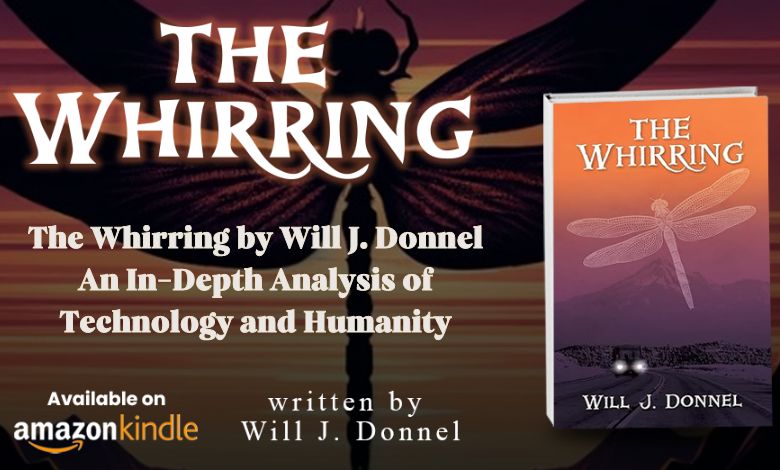Will J. Donnel’s The Whirring is a Kindle edition that captivates readers with its innovative blend of science fiction and suspense. This novel stands out for its insightful exploration of technological advancements and their profound impact on human identity. Through a compelling narrative, Donnel delves into the ethical and personal implications of cutting-edge technology, offering a thought-provoking experience that challenges readers to reflect on the intersection of technology and humanity.
Plot Overview and Key Themes
The Whirring is set in a near-future world where technology has evolved beyond merely affecting external environments to influencing cognitive processes directly. The story revolves around Alex Carter, a talented engineer who stumbles upon a groundbreaking technology capable of fundamentally transforming human cognition. This discovery catapults Alex into a whirlwind of high-stakes conflicts and moral dilemmas, driving the narrative forward with suspense and intrigue.
The central theme of the novel is the interplay between technology and human identity. Donnel explores how advanced technological innovations can reshape individuals’ perceptions of themselves and others, probing the essence of consciousness and the nature of self. The technology at the heart of The Whirring serves as both a plot device and a vehicle for deeper philosophical inquiry. By examining how such advancements challenge traditional notions of identity and selfhood, Donnel invites readers to consider the implications of technological progress on human nature.
Another crucial theme is the concept of power and influence. As Alex navigates the complexities of the technology, he encounters various forces seeking to control or exploit it for their own ends. Donnel’s exploration of this theme highlights the dual nature of technology—it can both empower and manipulate. The novel presents a nuanced view of the ethical challenges that arise from the use of advanced technology, offering a reflection on how technological tools can be wielded for both constructive and destructive purposes.
Character Development and Interactions
The characters in The Whirring are intricately crafted, each contributing to the novel’s thematic exploration. Alex Carter, as the protagonist, undergoes significant development throughout the story. Initially portrayed as a driven but somewhat naïve engineer, Alex’s journey is marked by his growing awareness of the ethical and personal implications of his work. His transformation from an idealistic professional to a more reflective and morally conflicted individual mirrors the novel’s broader exploration of technology’s impact on human identity. This character arc is both compelling and relatable, providing readers with a deeper understanding of Alex’s struggles and growth.
Supporting characters further enrich the narrative and add layers of complexity to the story. Dr. Lisa Chen, a prominent scientist with her own motivations, plays a crucial role in the plot. Her interactions with Alex introduce additional conflict and provide alternative perspectives on the technology and its implications. Dr. Chen’s character adds depth to the story, challenging Alex’s assumptions and driving key plot developments.
Max Reynolds, representing corporate interests, serves as a primary antagonist in the novel. His actions create significant tension and conflict, driving much of the story’s drama. Reynolds embodies the potential for technology to be used as a tool of manipulation and control, contrasting sharply with Alex’s more idealistic vision. The dynamic between Reynolds and Alex underscores the ethical dilemmas posed by the technology and enhances the novel’s exploration of power and influence.
Narrative Technique and Pacing
Will J. Donnel’s narrative style in The Whirring is marked by its clarity and effectiveness in conveying complex ideas. The author strikes a balance between technical descriptions and character-driven storytelling, ensuring that readers can engage with the material without being overwhelmed by jargon. Donnel’s prose is both descriptive and evocative, vividly bringing the futuristic setting and technological concepts to life.
The pacing of the novel is well-structured, combining high-intensity scenes with reflective moments that allow for a deeper exploration of characters and themes. The book’s chapters are crafted to build suspense and maintain reader engagement, with each section contributing to the overall momentum of the story. Donnel’s use of cliffhangers and plot twists adds to the novel’s tension, creating a gripping and immersive reading experience. The careful balance between action and introspection ensures that the narrative remains compelling while delving into the novel’s complex themes.
Critical Reception and Impact
The Whirring has garnered positive acclaim from critics and readers for its innovative approach to science fiction and its exploration of relevant themes. Reviewers have praised Donnel for crafting a narrative that is both thought-provoking and engaging, addressing contemporary issues related to technology and human identity with insight and originality. The novel’s relevance in today’s rapidly evolving technological landscape adds to its impact, offering readers a timely perspective on the potential consequences of technological advancements.
The book’s success is attributed to its combination of engaging storytelling, well-developed characters, and insightful thematic exploration. The Whirring resonates with readers interested in the intersection of technology and human nature, making it a significant addition to contemporary fiction. Donnel’s ability to blend suspense with intellectual depth ensures that the novel stands out as a noteworthy contribution to the genre, appealing to both fans of science fiction and those curious about the future of technology and its implications.
Conclusion
Will J. Donnel’s The Whirring is a standout Kindle edition that offers a compelling and thoughtprovoking narrative. Through its exploration of technology’s impact on human identity, rich character development, and engaging prose, the novel provides a deep and immersive reading experience. Donnel’s skillful storytelling and thematic depth make The Whirring a must-read for fans of contemporary fiction and anyone interested in the future of technology and humanity. As readers navigate the ethical and philosophical questions posed by the novel, they are invited to reflect on the broader implications of technological advancements and their role in shaping the future of human experience.

